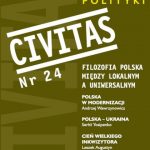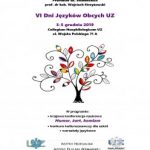Home » Posts tagged 'In Polish' (Page 3)
Tag Archives: In Polish
Platonic Concept of Reincarnation in Polish Philosophy

The latest issue of “Studia z Historii Filozofii” (Studies in the History of Philosophy, vol. 12, iss. 1) includes a paper by Adrian Habura on an episode in Polish reception of Plato’s theory of reincarnation or transmigration of souls.
Habura aims to present Stanisław Lisieckiʼs interpretation and assessment of Plato’s concept of metempsychosis, and then position his work against the background of diverse results of W. Lutosławski and P. Siwek. Lisieckiʼs reflection on Plato, and especially on his theory of reincarnation, proves that he was an unfairly forgotten scholar, who had had knowledge, capabilities and diligence sufficient to grant him a well-deserved place in Polish historiography and reception of Greek philosophy. Due to an unfortunate set of circumstances, including Lisiecki’s abandonment of Catholic clergy and his uncertainty of the value of his own work, he worked on margins of Polish academic life in the interwar period. Yet, as far as it was possible, he attempted to reconcile Platonism and Christian thought and find consolation in a perspective of future incarnations.
Full paper, in Polish, can be downloaded from the journal’s website here.
Stanisław Lisiecki as a Forgotten Christian Platonist

Philosophical quaterly journal “Kronos” has a regular section titled “Archive of Polish Philosophy”. The latest issue (2/2020, vol. 53) includes a paper by Adrian Habura on S. Lisiecki (1872-1960) who devoted twenty years of his life to Plato, studying and translating his dialogues. Habura’s paper in Polish is titled Stanisław Lisiecki – zapomniany chrześcijanin-platonik and he argues that Lisiecki was a forgotten Christian Platonist.
In one of his studies Lisiecki researched Plato’s concept of reincarnation and pre-existence of souls. He critically examined Plato’s arguments and their conformity with Christianity. Eventually he adhered to Plato’s views and tried to combine them with the New Testament, for despite his leaving the Catholic clergy he remained a Christian thinker.
Table of contents of the journal is here.
Wojciech Dzieduszycki as a Greek-Style Sage

Another paper from AΦR group was included in previously presented volume of “Civitas”. In her paper Anna Droś presented “A Conservative Thinker and a Greek-Style Sage”, a professor of Lvov University and a politician, count Wojciech Dzieduszycki (1848-1909), who was compared by his contemporaries to Socrates and who actually followed Socrates’ eccentric ways of behaviour, and especially his negligence for clothing.
Socrates was an ideal of a philosopher and a conservative for Dzieduszycki. In Socrates he saw a political thinker, a devoted citizen, and interpreted his views as a cure for deficiencies of modern world.
Full paper, in Polish, can be downloaded here.
Polish historians of Greek philosophy and their journeys to Athens

It comes as no surprise that experts in Greek philosophy and literature, classic scholars, or historians of the ancient world ache to visit the monuments of ancient history and to touch the relics of the Greek past. Many scholars were able to fulfill this dream and to undertake a journey to visit Athens and dwell the streets to search for Socrates or to have a discussion with the spirit of Plato in Academic garden.
Such journeys resulted very frequently in books or papers, memoirs or historical guides, that included their authors’ noble hopes and high expectations, but also their disappointments and grievances that Greek and Athenian reality at the turn of the 20th century could not meet their image of classical beauty and spiritual harmony.
In his paper in Polish, T. Mróz presented the works of four Polish authors who were experts in Greek literature and philosophy, who published extensively on this subject and who were sufficiently wealthy to travel to Greece, and to Athens in particular. In chronological order of their journeys, they are: Wojciech Dzieduszycki, Wincenty Lutosławski, Tadeusz Sinko and Władysław Witwicki. Their journeys took place between 1874 and 1937.
The paper can be downloaded here, and “Civitas” table of contents is here in English and here in Polish.
2019: the last talk (before the 2020 pandemic)

The Days of Foreign Languages at the University of Zielona Góra have already become an annual tradition. In 2019 they were devoted to humour, joke and comedy, and AΦR was there too. A talk on the examples of Plato’s humour in various Polish translations was delivered by Tomasz Mróz.
Selected passages from the Eutyphro, Apology, Republic, and Cratylus in various Polish translations were compared, with occasional help of Plato translations into other languages, that is, German (F. Schleiermacher, W.S. Teuffel), English (H.N. Fowler, H. Tredennick, G. Grube, P. Shorey, W.H.D. Rouse, A.D. Lindsay, D. Lee, F. M. Cornford), Russian (M.S. Solovyov, A.N. Yegunov), Italian (G. Giardini) and, last but not least, Ukrainian (Y. Kobiv).
The stress was laid on the issue of who of the translators was able to discover Plato’s humour and to render it properly into Polish. Not to mention the more general conclusion on Plato’s comic talents, for philosophy has never been an exclusive bussiness of sad and old men with beards 😉
Recent commentaries